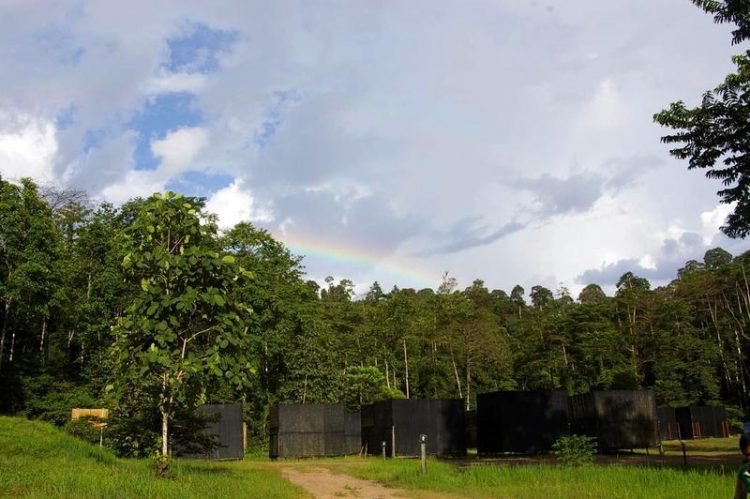More carbohydrates make trees more resistant to drought

Malula Field Station in Malaysia: The experiments are conducted under controlled conditions in the large, black cubes. Michael O'Brien/UZH
Water is the limiting factor for many plants and trees. Consequently, there are grave concerns that the rainfall patterns altered by climate change could trigger a forest decline on a global scale. According to climate researchers, Switzerland is also affected:
The climate models even project hotter and drier summers for this country. An international research team headed by Michael O’Brien, an ecologist at the University of Zurich, is now studying which factors govern the resistance of tropical trees to periods of drought. As the scientists reveal in their study published in Nature Climate Change, stored carbohydrates play a key role in the resilience of the individual plant.
1,400 saplings of ten species monitored
While stored starch and soluble sugar in plant tissues were thought to influence the resistance and resilience of trees positively during periods of drought, this supposition had not been proven. O’Brien and his team planted 1,400 saplings of ten different tropical tree species in Malaysia and devised a novel experiment to manipulate the carbohydrates stored and observe their reaction.
The researchers increased or decreased the concentration of stored carbohydrates and exposed the seedlings to an artificial drought period. It became clear that young trees with more stored carbohydrates were able to maintain the vital water content in the stem for longer than those with fewer stored carbohydrates. “The better drought resistance and thus the greater chance of surviving a period of drought evidently depends on the quantity of carbohydrates stored,” concludes O’Brien.
Carbohydrate content different in every tree species
According to the scientists, the ability to store carbohydrates varies both within and between species: “As different trees display a different mortality due to aridity, the impact of a forest decline triggered by climate change is cushioned,” O’Brien is convinced. These new insights are also significant for reforestation: The planting of species that store more carbohydrates can be favored to boost the forests’ resistance to the drier climates predicted by the climate change models.
Literature:
Michael J. O’Brien, Sebastian Leuzinger, Christopher D. Philipson, John Tay and Andy Hector, Drought survival of tropical tree seedlings enhanced by non-structural carbohydrate level. Nature Climate Change, June 29, 2014. DOI:10.1038/nclimate2281
Contacts:
Dr Michael J. O’Brien
Institute of Evolutionary Biology and Environmental Studies
University of Zurich
Winterthurerstrasse 190
CH-8057 Zürich
Tel. +41 44 635 61 05 (currently only reachable per e-mail)
Email: michael.obrien@ieu.uzh.ch
Bettina Jakob
Media Relations
University of Zurich
Tel. +41 44 634 44 39
Email: bettina.jakob@kommunikation.uzh.ch
Media Contact
All latest news from the category: Life Sciences and Chemistry
Articles and reports from the Life Sciences and chemistry area deal with applied and basic research into modern biology, chemistry and human medicine.
Valuable information can be found on a range of life sciences fields including bacteriology, biochemistry, bionics, bioinformatics, biophysics, biotechnology, genetics, geobotany, human biology, marine biology, microbiology, molecular biology, cellular biology, zoology, bioinorganic chemistry, microchemistry and environmental chemistry.
Newest articles

Properties of new materials for microchips
… can now be measured well. Reseachers of Delft University of Technology demonstrated measuring performance properties of ultrathin silicon membranes. Making ever smaller and more powerful chips requires new ultrathin…

Floating solar’s potential
… to support sustainable development by addressing climate, water, and energy goals holistically. A new study published this week in Nature Energy raises the potential for floating solar photovoltaics (FPV)…

Skyrmions move at record speeds
… a step towards the computing of the future. An international research team led by scientists from the CNRS1 has discovered that the magnetic nanobubbles2 known as skyrmions can be…





















